Art house: No Regrets for Our Youth – Hara Setsuko stars in Akira Kurosawa’s post-war drama
Acclaimed director’s first post-war film created his most indelible heroine – and a rare early example of Japanese girl power.

Akira Kurosawa’sfirst post-war film, No Regrets for Our Youth (1946), appeared as a defeated and devastated Japan turned against its wartime values and absorbed new ones, including democracy and rights for women, from its American occupiers. This film, about a privileged young woman, played by Setsuko Hara, whose professor father and activist husband are persecuted for their stands against fascism, was propaganda for the occupation policy. But it also reflected a genuine reaction against militarist rule, which had led the nation to disaster.
Kurosawa, then in his mid-30s, had also made propaganda films for the war effort, though his last wartime film, the 1945 period drama The Men Who Tread on the Tiger’s Tail, was criticised by the censors for comic Enoken’s cheeky porter, who disrespects his samurai superiors.
In No Regrets for Our Youth, however, the tone is entirely serious and the story is based on real-life incidents. When it starts, in 1933, the heroine, Yukie (Hara), is a coquettish if earnest young woman who is being pursued by two of her father’s students, the principled, passionate Noge (Susumu Fujita) and the opportunistic, easy-going Itokawa.
Naturally, she falls for Noge, but his anti-fascist activities land him in jail. Thus begins Yukie’s odyssey towards both true love and self-realisation. During Noge’s long and sometimes mysterious absences, she pines for meaningful work, but after moving from Kyoto to Tokyo, drifts through a succession of unfulfilling jobs. Yukie and Noge finally unite and marry, but their happiness is brief. He is again arrested, accused of being an enemy spy.
Here the film makes a sharp break from its melodramatic story of star-crossed romance and becomes – unusually in both Kurosawa’s filmography and Japanese films of the era – a potent ode to female power and resilience. Yukie decides to help Noge’s impoverished farmer parents but arrives to find them ostracised by other villagers because of their suspect son. With hands more used to playing the piano than hard labour, she pitches in with her spunky mother-in-law as her father-in-law sits mute and defeated.